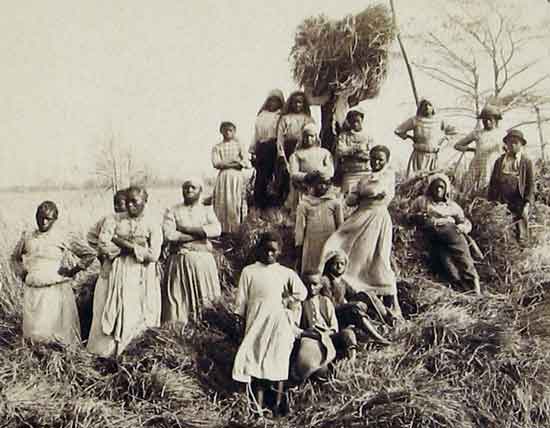
African American anti-slavery activitst, poet and educator, Charlotte Forten Grimke
“The Evil Shadow of Slavery No Longer Hangs Over Them”: Charlotte Forten Describes Her Experiences Teaching on the South Carolina Sea Islands, 1862 -- During the Civil War, when Union forces occupied the South Carolina sea islands of St. Helena and Port Royal, white slaveowners fled but their slaves remained. It was here, in October 1862, that Charlotte Forten arrived under the auspices of the Philadelphia Port Royal Relief Association to teach the newly liberated slaves. Forten (later Charlotte Forten Grimke) was born in Philadelphia in 1837 into a family of well-to-do, free blacks who were active in the abolitionist movement. Forten was a teacher and a writer, known today for her extensive diaries and her articles. An educated woman and a product of free black society, Forten hovered uneasily between the worlds of blacks and whites. In this article for a white audience she expressed her jubilation about the freedom her students were newly experiencing. She also revealed her ambivalence about these people who were similar to herself, yet at the same time so different.

The first day at school was rather trying. Most of my children were very small, and consequently restless. Some were too young to learn the alphabet. These little ones were brought to school because the older children — in whose care their parents leave them while at work — could not come without them. We were therefore willing to have them come, although they seemed to have discovered the secret of perpetual motion, and tried one’s patience sadly. But after some days of positive, though not severe treatment, order was brought out of chaos, and I found but little difficulty in managing and quieting the tiniest and most restless spirits. I never before saw children so eager to learn, although I had had several years' experience in New England schools. Coming to school is a constant delight and recreation to them. They come here as other children go to play. The older ones, during the summer, work in the fields from early morning until eleven or twelve o’clock, and then come into school, after their hard toil in the hot sun, as bright and as anxious to learn as ever.

Of course there are some stupid ones, but these are the minority. The majority learn with wonderful rapidity. Many of the grown people are desirous of learning to read. It is wonderful how a people who have been so long crushed to the earth, so imbruted as these have been, — and they are said to be among the most degraded negroes of the South, — can have so great a desire for knowledge, and such a capability for attaining it. One cannot believe that the haughty Anglo Saxon race, after centuries of such an experience as these people have had, would be very much superior to them. And one’s indignation increases against those who, North as well as South, taunt the colored race with inferiority while they themselves use every means in their power to crush and degrade them, denying them every right and privilege, closing against them every avenue of elevation and improvement. Were they, under such circumstances, intellectual and refined, they would certainly be vastly superior to any other race that ever existed.

After the lessons, we used to talk freely to the children, often giving them slight sketches of some of the great and good men. Before teaching them the “John Brown” song, which they learned to sing with great spirit. Miss T. told them the story of the brave old man who had died for them. I told them about Toussaint, thinking it well they should know what one of their own color had done for his race. They listened attentively, and seemed to understand. We found it rather hard to keep their attention in school. It is not strange, as they have been so entirely unused to intellectual concentration. It is necessary to interest them every moment, in order to keep their thoughts from wandering. Teaching here is consequently far more fatiguing than at the North. In the church, we had of course but one room in which to hear all the children; and to make one’s self heard, when there were often as many as a hundred and forty reciting at once, it was necessary to tax the lungs very severely.
My walk to school, of about a mile, was part of the way through a road lined with trees, — on one side stately pines, on the other noble live-oaks, hung with moss and canopied with vines. The ground was carpeted with brown, fragrant pine-leaves; and as I passed through in the morning, the woods were enlivened by the delicious songs of mocking-birds, which abound here, making one realize the truthful felicity of the description in “Evangeline,” —
"The mocking-bird, wildest of singers,
Shook from his little throat such floods of delirious musicThat the whole air and the woods and the waves seemed silent to listen."
The hedges were all aglow with the brilliant scarlet berries of the cassena, and on some of the oaks we observed the mistletoe, laden with its pure white, pearl-like berries. Out of the woods the roads are generally bad, and we found it hard work plodding through the deep sand. [Source: Charlotte Forten, “Life on the Sea Islands,” Atlantic Monthly 13 (May 1864): 587–596.]




Thanks for your good and reliable post
ReplyDeletehttp://gainmoneyfast.com/-94216.htm/
Thank you for posting this information about Charlotte Forten Grimke. I am featuring her on March 17, as a writer and activist. I have visited St. Helena Island and the Penn Center several times as part of the Salkehatchie project there.
ReplyDelete